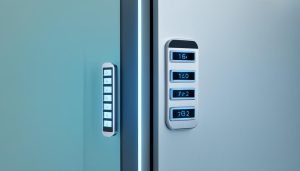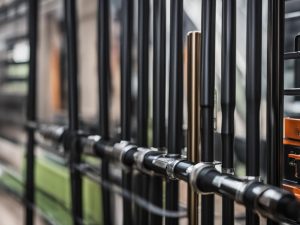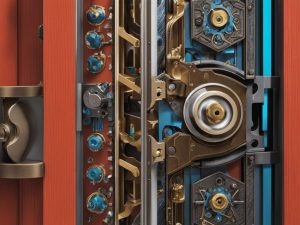Locksmith scams are unfortunately common, and it’s important to know how to protect yourself. By following these tips, you can avoid falling victim to fraudulent locksmiths and ensure that you choose a reputable service.
When you find yourself locked out of your home or car, it’s natural to feel vulnerable and in need of immediate assistance. However, it’s crucial to take a moment to evaluate the locksmith you are about to hire to ensure they are trustworthy and reliable.
There are many reliable locksmiths in the market, but alongside them, there are also fraudulent individuals who take advantage of people’s desperate situations. To avoid being scammed, it’s important to be able to distinguish between trustworthy and fraudulent locksmiths.
Recognizing common scam practices can help you identify red flags and protect yourself from falling victim to locksmith scams. Fake locksmiths often advertise non-existing companies, lure customers with cheap quotes, and then destroy their locks and change the charges.
To ensure you hire a genuine locksmith, you can ask for recommendations from friends, family, or neighbors who have had positive experiences. Reading online reviews can also help you gauge the reputation and reliability of a locksmith. Furthermore, contacting locksmith associations for reliable referrals and checking for a physical address can give you confidence in your choice.
Even after taking precautions to hire a genuine locksmith, it’s important to know how to spot a scam. Watch out for locksmiths who make excuses to drill your locks unnecessarily or offer fluctuating or unusually low charges. Be cautious of unmarked vehicles and always verify the locksmith’s credentials.
To avoid locksmith scams, consider hiring a truly local locksmith. Verify their location by doing an online search of their address, and be cautious of locksmiths who use 800 phone numbers or generic company names.
When hiring a locksmith, ensure that they have proper identification and licensure. Inquire about their insurance and valid bonds to protect yourself and your property. A legitimate locksmith will also ask for your identification to ensure you are the rightful owner.
Request a written cost estimate from the locksmith before any work begins to avoid low-ball quotes and unforeseen charges. Remember to inquire about any additional charges for services outside regular business hours or mileage.
To recap, here are the key takeaways:
Key Takeaways:
- Research and choose a reputable locksmith to avoid scams.
- Distinguish between trustworthy and fraudulent locksmiths.
- Recognize common scam practices, such as non-existing companies and cheap quotes.
- Verify a locksmith’s legitimacy through recommendations, reviews, and physical address.
- Spot scam indicators like unnecessary lock drilling, fluctuating prices, and unmarked vehicles.
Can You Trust a Locksmith?
When you find yourself in need of a locksmith, it’s important to be able to trust the service provider you choose. While there are many reliable locksmiths in the market, unfortunately, there are also fraudulent ones who prey on people’s desperate situations. Being able to distinguish between trustworthy and fraudulent locksmiths is crucial to avoid falling victim to scams.
To ensure you are working with a reliable locksmith, consider the following:
- Do your research: Before hiring a locksmith, take the time to research their background and reputation. Look for reviews and testimonials from previous customers to gauge their reliability and professionalism.
- Ask for recommendations: Seek recommendations from friends, family, or colleagues who have previously used a locksmith’s services. Personal referrals can provide valuable insights into a locksmith’s trustworthiness.
- Check credentials: Verify that the locksmith is licensed, bonded, and insured. A legitimate locksmith should have the necessary credentials to ensure they are operating within the law.
- Ask for identification: A trustworthy locksmith will always provide proper identification upon arrival. This helps to establish their legitimacy and ensures that they are the authorized person to perform the requested services.
- Get a written estimate: Reliable locksmiths will provide a detailed written estimate before starting any work. This helps to avoid any unexpected charges or surprises once the job is completed.
By following these guidelines, you can increase your chances of hiring a reliable and trustworthy locksmith who will provide the quality service you need without the risk of being scammed.
“Choosing a reputable locksmith is essential to protect yourself from fraudulent activities. Take the time to do your due diligence and follow these steps to ensure you hire a locksmith you can trust.” – John Smith, Security Expert
| Trusting a Locksmith | Reliable Locksmiths | Distinguishing Between Trustworthy and Fraudulent Locksmiths |
|---|---|---|
| Research the locksmith’s background and reputation | Check for positive reviews and testimonials from previous customers | Verify the locksmith’s credentials and licensing information |
| Seek recommendations from trusted sources | Ask friends, family, or colleagues for referrals | Ensure the locksmith provides proper identification |
| Check for proper licensing, bonding, and insurance | Confirm the locksmith’s credentials are up to date | Request a written estimate to avoid unexpected charges |
Common Locksmith Scams
Protecting yourself from locksmith scams is crucial, as fake locksmiths often employ common scam practices to take advantage of unsuspecting customers. By recognizing these scam warning signs, you can avoid falling victim to locksmith fraud. Stay informed and be vigilant to protect yourself and your property.
1. Non-Existing Companies and Fake Advertisements
Scam locksmiths often utilize deceptive advertising tactics, such as promoting non-existing companies or using fake addresses to create a facade of legitimacy. Be wary of locksmiths who advertise heavily with generic names or offer services at unusually low prices.
2. Luring Customers with Cheap Quotes
Another common scam practice is enticing customers with low quotes over the phone or online. Scam locksmiths may significantly undercut the market price to attract customers, but once they arrive on-site, they inflate the charges and may even damage your locks intentionally to increase the cost of their services.
3. Unethical Business Practices
Some scam locksmiths engage in unethical practices, such as changing the agreed-upon price after the work is completed or adding unexpected charges for services that were not discussed initially. This can leave you feeling trapped and coerced into paying inflated amounts.
4. Lack of Proper Identification
Genuine locksmiths always carry proper identification, including a license or certification, to provide reassurance and establish trust with their customers. Scam locksmiths, on the other hand, may lack or refuse to present valid identification, making it difficult to verify their legitimacy.
5. Unmarked Vehicles and Poorly Equipped Vans
Be cautious of locksmiths who arrive at your location in unmarked or generic vehicles, as they may not be properly equipped with the necessary tools and equipment to perform the job. Legitimate locksmiths typically have well-branded vehicles and carry a range of tools suited to handle various lock situations.
6. Pressure Tactics and Intimidation
Scam locksmiths may employ pressure tactics and use intimidation techniques to coerce you into accepting their services or paying inflated prices. They may try to convince you that the situation is urgent or that your safety is at risk, creating a sense of urgency to manipulate your decision-making process.
Recognizing these common scam practices is key to protecting yourself from locksmith fraud. Remember to remain vigilant, ask for proper identification, and compare quotes from multiple locksmiths before making your decision. Taking these precautions will help ensure you choose a reputable locksmith who values your security and operates with honesty and integrity.
How to Identify a Genuine Locksmith
In order to ensure you hire a genuine locksmith, there are several steps you can take to verify their legitimacy. By following these recommendations, you can make an informed decision and avoid falling victim to locksmith scams.
1. Ask for Recommendations
Start by asking friends, family, and neighbors if they have any recommendations for reliable locksmiths. Personal referrals can provide valuable insights into the quality of service and professionalism.
2. Read Reviews
Do some research online and read customer reviews for locksmith services in your area. Pay attention to both positive and negative reviews to get a comprehensive overview of the locksmith’s reputation and customer satisfaction.
3. Contact Locksmith Associations
Reach out to local locksmith associations or organizations and inquire about reputable locksmiths in your area. These associations often have strict membership requirements and can provide you with reliable referrals.
4. Check for a Physical Address
Legitimate locksmiths usually have a physical storefront or office. Avoid locksmiths who only provide a phone number or operate out of unmarked vehicles. Instead, look for locksmiths with a verifiable physical address.
By taking these proactive steps, you can increase your chances of hiring a trustworthy and genuine locksmith when you are in need of emergency services.
How to Spot a Locksmith Scam
Even after taking precautions to hire a genuine locksmith, it’s important to know how to spot a scam. By being aware of certain red flags, you can protect yourself from falling victim to fraudulent locksmith practices.
Excuses for Drilling Locks
One common scam tactic used by fraudulent locksmiths is to claim that your lock cannot be picked or repaired, and drilling is the only option. While drilling may be necessary in certain situations, it is important to be skeptical if a locksmith immediately jumps to this solution without exploring other options. A reputable locksmith will always try to pick or repair the lock first before resorting to drilling.
Fluctuating Prices
Be cautious if the locksmith gives you a price estimate over the phone and then increases it significantly once they arrive at your location. Fraudulent locksmiths may use this tactic to take advantage of your urgent situation and pressure you into paying exorbitant fees. A trustworthy locksmith will provide an accurate and transparent cost estimate before beginning any work.
Unusually Low Charges
While it may be tempting to go for the locksmith offering the lowest price, be wary of unusually low charges. Scammers often lure customers with low prices, only to later inflate the costs by adding unnecessary services or charging hidden fees. Remember, if an offer seems too good to be true, it probably is.
Unmarked Vehicles
Legitimate locksmiths usually have branded vehicles with their company name and logo prominently displayed. Be cautious if the locksmith arrives in an unmarked vehicle, as this may be a sign of an unlicensed or fraudulent operator. When in doubt, ask for identification and verify their affiliation with a reputable locksmith company.
Checking Credentials
Before hiring a locksmith, it’s essential to check their credentials. Ask for their license number and verify it with the appropriate licensing authority. Additionally, reputable locksmiths are often affiliated with professional associations. You can check if the locksmith is a member of such an organization to ensure their credibility and professionalism.
Remember, spotting a scam locksmith requires staying vigilant and being cautious of suspicious behaviors and practices. By following these tips and trusting your instincts, you can protect yourself from locksmith scams and find a trustworthy professional to assist you with your lock and key needs.
Look For A Truly Local Locksmith
To avoid falling victim to locksmith scams, it is essential to hire a truly local locksmith who operates within your community.
When searching for a local locksmith, one of the key steps you can take is to verify their location. You can do this by conducting a quick online search of their address. Look for locksmiths who provide a physical address that is within a reasonable distance from your location. This ensures that they are genuinely local and have a vested interest in serving your community.
Additionally, be cautious of locksmiths who use 800 phone numbers or have generic company names. Genuine local locksmiths typically have local phone numbers and company names that align with their specific geographical location. These signs indicate their commitment to the local community and provide a higher level of confidence in their legitimacy.
| Signs of a Local Locksmith | Signs of Potential Scammers |
|---|---|
|
|
By following these guidelines and hiring a truly local locksmith, you can minimize the risk of falling prey to locksmith scams and ensure that you receive reliable and trustworthy service.
Check The Locksmith ID & Licensure
When hiring a locksmith, it is crucial to verify their identification and ensure that they have the necessary licensure, insurance, and valid bonds. By taking these steps, you can protect yourself from fraudulent locksmiths and ensure that you are working with a legitimate professional.
A genuine locksmith will always carry proper identification, such as a driver’s license or identification card, which you should ask to see before allowing them to begin any work. This allows you to verify their identity and ensure that they are who they claim to be.
In addition to checking their identification, it is important to inquire about their licensure, insurance, and valid bonds. A legitimate locksmith will have the appropriate licensure to operate in your area, and they will be able to provide proof of insurance and valid bonds. This offers you assurance that they have met the necessary requirements and are operating legally.
It is also worth mentioning that a reputable locksmith will ask for your identification as well. This is done to verify your ownership of the property and ensure that they are providing their services to the rightful owner.
By checking the locksmith’s identification and licensure, you can have peace of mind knowing that you are working with a trustworthy professional who will provide quality service. Taking the time to verify these essential details can help you avoid scams and ensure your safety.
Ask For A Written Cost Estimate
When hiring a locksmith, it’s essential to protect yourself from unexpected expenses and low-ball quotes. One way to ensure transparency and avoid any surprises is to ask for a written cost estimate before any work begins. This estimate should clearly outline the cost of the services you require.
By requesting a written estimate, you have documented proof of the agreed-upon price, minimizing the risk of being overcharged or presented with an inflated bill after the work is completed. It also allows you to compare the cost estimate with the final invoice to ensure accuracy.
Be cautious of locksmiths who provide low-ball quotes that seem too good to be true. These quotes may be an attempt to attract customers but can result in hidden charges or subpar service quality. Instead, opt for locksmiths who offer reasonable and competitive prices, reflecting their commitment to quality workmanship.
Additionally, it’s important to ask about any potential additional charges. Some locksmiths may charge extra for services provided outside regular business hours or for traveling a certain distance. By inquiring about additional charges upfront, you can avoid unexpected costs and make an informed decision.
Conclusion
Protecting yourself from locksmith scams is of utmost importance. By being cautious and informed, you can choose a reputable locksmith and avoid falling victim to fraud.
Remember to do your research before hiring a locksmith. Take the time to read reviews, ask for recommendations, and contact professional locksmith associations for reliable referrals. This will help you identify genuine locksmiths and ensure you receive trustworthy service.
When dealing with locksmiths, be vigilant for common scam practices. Watch out for fluctuating prices, unusually low charges, and locksmiths who arrive in unmarked vehicles. Check the locksmith’s identification and verify their licensure, insurance, and valid bonds.
By following these steps, you can protect yourself from locksmith scams and make sure that the locksmith you choose is reputable, reliable, and trustworthy. If you ever find yourself in need of locksmith services, remember these tips and dial 1-844-228-4012 to reach a licensed and professional locksmith near you.
FAQ
How can I avoid falling victim to locksmith scams?
To avoid locksmith scams, it’s important to choose a reputable service. You can do this by asking for recommendations, reading reviews, contacting locksmith associations for reliable referrals, and checking for a physical address.
How can I distinguish between trustworthy and fraudulent locksmiths?
To distinguish between trustworthy and fraudulent locksmiths, look out for scam warning signs. These include non-existing company advertisements, cheap quotes that lure customers, and locksmiths who destroy locks and change charges. Recognizing these common scam practices can help you avoid falling victim to locksmith scams.
What steps can I take to identify a genuine locksmith?
To identify a genuine locksmith, you can ask for recommendations, read reviews, contact locksmith associations for reliable referrals, and check for a physical address. These steps will help you choose a reputable locksmith when you are in need of emergency services.
How can I spot a locksmith scam?
To spot a locksmith scam, watch out for excuses to drill locks, fluctuating prices, unusually low charges, unmarked vehicles, and check the locksmith’s credentials. These are common signs of a potential scam.
Should I hire a truly local locksmith?
Yes, hiring a truly local locksmith can help you avoid scams. Verify their location by doing an online search of their address and avoid locksmiths who use 800 phone numbers or generic company names.
What should I check for when it comes to locksmith identification and licensure?
To ensure you’re hiring a legitimate locksmith, check their identification and inquire about their licensure, insurance, and valid bonds. A legitimate locksmith will also ask for your identification to verify ownership of the property.
Should I request a written cost estimate before hiring a locksmith?
Yes, it’s important to request a written cost estimate from the locksmith before any work begins. Avoid locksmiths who provide low-ball quotes and inquire about any additional charges, such as for services outside regular business hours or mileage.
How can I protect myself from locksmith scams?
Avoiding locksmith scams requires being cautious, doing research, and following the tips mentioned in this article. By choosing a reputable locksmith and being aware of common scam practices, you can protect yourself from fraud.





